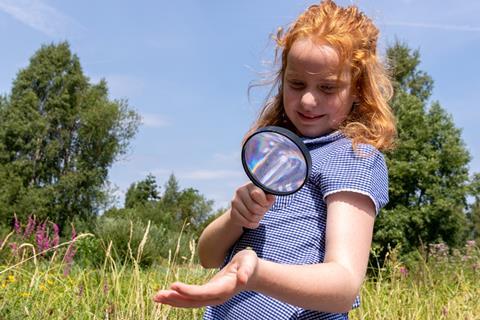Why moving learning beyond the classroom is so central to the recovery of schools, pupils and teachers post-pandemic.

A year since the first lockdown and the urgent need to support children and young peoples’ mental and physical health remains.
Schools remain one of the most important settings and gateways through which we can support the health and wellbeing of children and young people (Fazel et al., 2014). Schools are on the front-line helping them re-engage with each other, with their learning, and with the world around them. There is far more we need to do to support them in this role.
While we still lack insight into the relative effectiveness of different types of learning beyond the classroom intervention, what is very clear - and this is really unusual in education - is that the extensive academic literature and evidence base in this area is almost universally positive, especially in relation to learning outside the classroom in natural environments.
Studies conclude that well-planned learning outside the classroom - whether indoors or outdoors – can deliver a wide range of positive outcomes and co-benefits, including to teacher and pupil health and wellbeing.
The notion of ‘catch up’ learning is recognised by Sir Kevan Collins (education recovery commissioner) to be about more than time spent in classrooms. So, there is an opportunity to continue to break down the artificial boundaries that exist between learning in different environments and different contexts, and to recognise that the creative teaching practices that characterise high quality learning beyond the classroom have much to offer.
Learning beyond the classroom is a well-evidenced, universally available, and low-cost intervention that can contribute to school recovery, and deliver immediate benefits to all children and young people in education.
What’s more, the UK is blessed with an infrastructure to support schools deliver learning outside the classroom both safely and effectively.

Over the last year, many inspiring case studies demonstrate the mutual benefit that can be delivered when schools work in partnership with their local learning outside the classroom providers to help deliver their recovery curriculum. National insight pre-Covid found that most school leaders wanted to move more of their learning beyond the indoor classroom, and since Covid, this demand has become overt.
The Council for Learning Outside the Classroom (CLOtC), and our partners in the Outdoor Education Advisers Panel (OEAP), exist to help schools and the wealth of different learning outside the classroom service providers work together safely and effectively.
Help for schools:
Our free resources include two guides produced in partnership with the OEAP featuring ideas and tools designed specifically to help schools start to plan and deliver learning outside the classroom, so that they and their students get the most from the experience.
- ‘Learning Beyond – starting your LOtC journey’ – a guide to help you embed LOtC in your school by working through our new Learning Beyond approach.
- ‘Get Outside – taking learning beyond the classroom in support of your recovery curriculum’ – an up-to-date guide to support you to deliver Covid-safe learning in your school grounds.
Schools can also join the CLOtC as a member to receive whole school access to resources and support to help manage the current situation and plan your curriculum delivery.
For LOtC providers:
- The LOtC Quality Badge: as schools reopen to more pupils after lockdown, there is ongoing focus on ensuring good risk management, including infection control. Checking that a provider holds the LOtC Quality Badge is the easiest way for schools to confirm that quality and safety of services have been externally accredited. The Badge (endorsed by the Department for Education) is the only national award that combines quality of learning and safety into one easily recognisable and trusted award for all types of learning outside the classroom providers and organisations.
- The LOtC Site Provider Award is also available for organisations who welcome educational visits to their site, but who do not provide direct educational services themselves. It reflects good quality LOtC facilitation and effective risk management.
- Advocacy: since the start of lockdown, we have continued to champion the role of LOtC and its providers across all the sectors we represent in supporting school recovery. For example, we convened the Turning Learning inside Out Consortium and are a member of the DfE’s School Travel Sector Stakeholder Group.
The Council for Learning Outside the Classroom charity campaigns for every child to experience the world beyond the classroom as an essential part of their education. Find out more at www.lotc.org.uk
















No comments yet